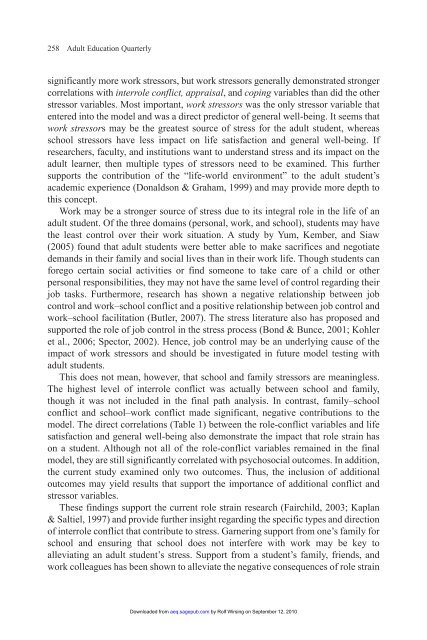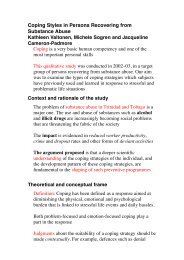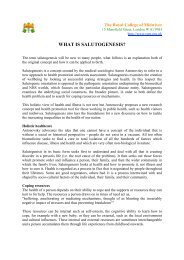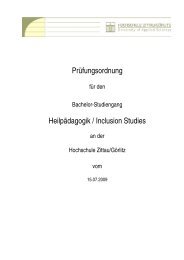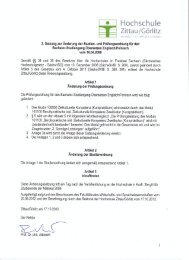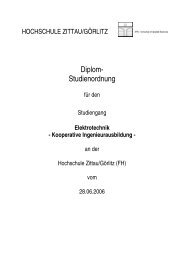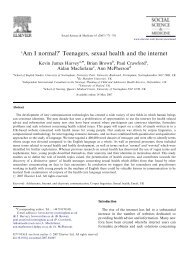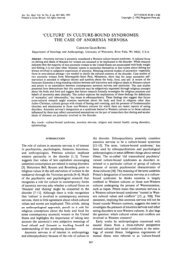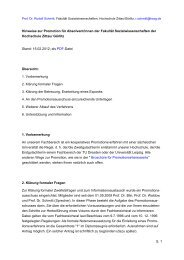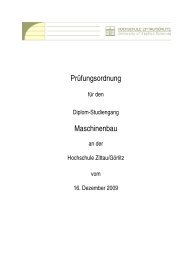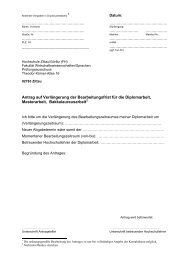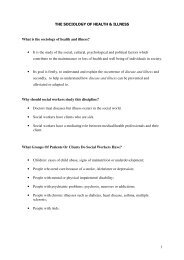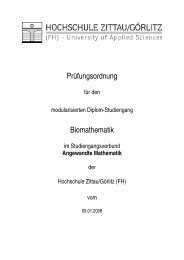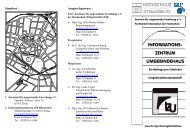Dealing With the Stress of College
Dealing With the Stress of College
Dealing With the Stress of College
Create successful ePaper yourself
Turn your PDF publications into a flip-book with our unique Google optimized e-Paper software.
258 Adult Education Quarterly<br />
significantly more work stressors, but work stressors generally demonstrated stronger<br />
correlations with interrole conflict, appraisal, and coping variables than did <strong>the</strong> o<strong>the</strong>r<br />
stressor variables. Most important, work stressors was <strong>the</strong> only stressor variable that<br />
entered into <strong>the</strong> model and was a direct predictor <strong>of</strong> general well-being. It seems that<br />
work stressors may be <strong>the</strong> greatest source <strong>of</strong> stress for <strong>the</strong> adult student, whereas<br />
school stressors have less impact on life satisfaction and general well-being. If<br />
researchers, faculty, and institutions want to understand stress and its impact on <strong>the</strong><br />
adult learner, <strong>the</strong>n multiple types <strong>of</strong> stressors need to be examined. This fur<strong>the</strong>r<br />
supports <strong>the</strong> contribution <strong>of</strong> <strong>the</strong> “life-world environment” to <strong>the</strong> adult student’s<br />
academic experience (Donaldson & Graham, 1999) and may provide more depth to<br />
this concept.<br />
Work may be a stronger source <strong>of</strong> stress due to its integral role in <strong>the</strong> life <strong>of</strong> an<br />
adult student. Of <strong>the</strong> three domains (personal, work, and school), students may have<br />
<strong>the</strong> least control over <strong>the</strong>ir work situation. A study by Yum, Kember, and Siaw<br />
(2005) found that adult students were better able to make sacrifices and negotiate<br />
demands in <strong>the</strong>ir family and social lives than in <strong>the</strong>ir work life. Though students can<br />
forego certain social activities or find someone to take care <strong>of</strong> a child or o<strong>the</strong>r<br />
personal responsibilities, <strong>the</strong>y may not have <strong>the</strong> same level <strong>of</strong> control regarding <strong>the</strong>ir<br />
job tasks. Fur<strong>the</strong>rmore, research has shown a negative relationship between job<br />
control and work–school conflict and a positive relationship between job control and<br />
work–school facilitation (Butler, 2007). The stress literature also has proposed and<br />
supported <strong>the</strong> role <strong>of</strong> job control in <strong>the</strong> stress process (Bond & Bunce, 2001; Kohler<br />
et al., 2006; Spector, 2002). Hence, job control may be an underlying cause <strong>of</strong> <strong>the</strong><br />
impact <strong>of</strong> work stressors and should be investigated in future model testing with<br />
adult students.<br />
This does not mean, however, that school and family stressors are meaningless.<br />
The highest level <strong>of</strong> interrole conflict was actually between school and family,<br />
though it was not included in <strong>the</strong> final path analysis. In contrast, family–school<br />
conflict and school–work conflict made significant, negative contributions to <strong>the</strong><br />
model. The direct correlations (Table 1) between <strong>the</strong> role-conflict variables and life<br />
satisfaction and general well-being also demonstrate <strong>the</strong> impact that role strain has<br />
on a student. Although not all <strong>of</strong> <strong>the</strong> role-conflict variables remained in <strong>the</strong> final<br />
model, <strong>the</strong>y are still significantly correlated with psychosocial outcomes. In addition,<br />
<strong>the</strong> current study examined only two outcomes. Thus, <strong>the</strong> inclusion <strong>of</strong> additional<br />
outcomes may yield results that support <strong>the</strong> importance <strong>of</strong> additional conflict and<br />
stressor variables.<br />
These findings support <strong>the</strong> current role strain research (Fairchild, 2003; Kaplan<br />
& Saltiel, 1997) and provide fur<strong>the</strong>r insight regarding <strong>the</strong> specific types and direction<br />
<strong>of</strong> interrole conflict that contribute to stress. Garnering support from one’s family for<br />
school and ensuring that school does not interfere with work may be key to<br />
alleviating an adult student’s stress. Support from a student’s family, friends, and<br />
work colleagues has been shown to alleviate <strong>the</strong> negative consequences <strong>of</strong> role strain<br />
Downloaded from<br />
aeq.sagepub.com by Rolf Wirsing on September 12, 2010


